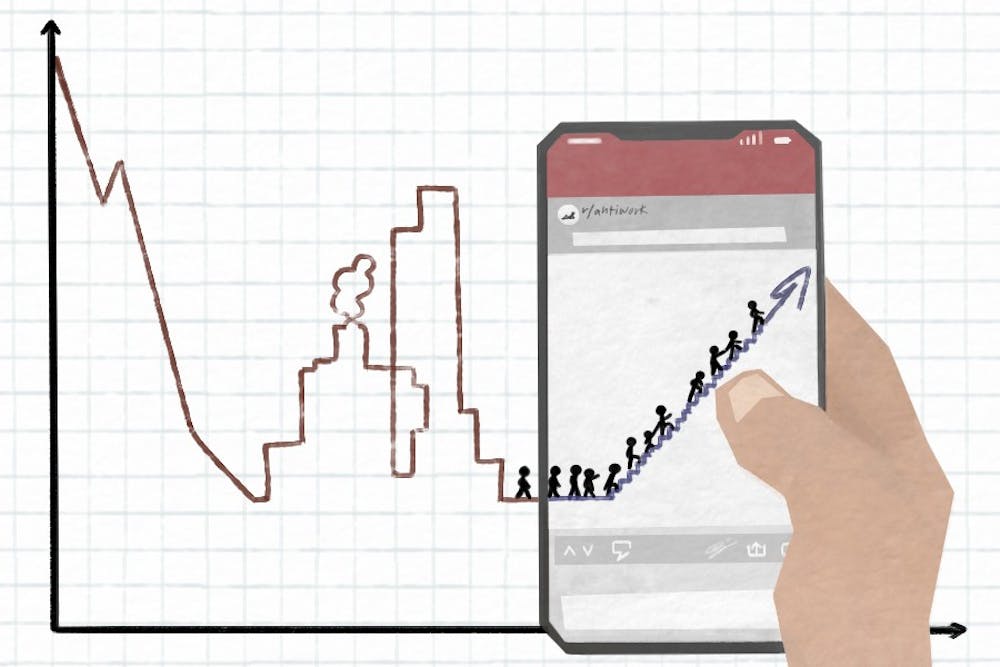When 1,400 Kellogg’s workers went on strike because of union negotiations in October 2021, hundreds of online supporters flooded the company’s job application system in an effort to confuse recruiters. In the wake of widespread apathy surrounding the realities of the modern workplace, these virtual protesters had turned to the “anti–work” movement, which has its social media roots in a Reddit forum created in 2013. As burnout and work dissatisfaction seem to be at an all–time high, social media has been an avid discussion—and protest—space for expressing these concerns.
r/Antiwork is a Reddit community that describes itself as dedicated to providing a space for “those who want to end work, are curious about ending work, want to get the most out of a work–free life, want more information on anti–work ideas, and want personal help with their own jobs/work–related struggles.” What started out as a small, politically far–left assemblage of people interested in calling for an end to exploitative and unfulfilling working conditions has exploded into a community with 1.6 million members.
The anti–work movement stands in stark contrast to millennial–driven hustle culture, described as “performative workaholism” by New York Times writer Erin Griffith in 2019. Hustle culture is everything the anti–work mindset isn’t—it emphasizes going above and beyond in your job at all times, withstanding rejection and burnout, and of course, constantly being on the grind towards making money. Though hustle culture has had considerable influence across the internet, the rise in anti–work conversations reveal a shift in how people are thinking about work post–pandemic.
In the past year and a half, many had a chance to rethink their jobs. Increased work–from–home opportunities created due to COVID–19 remain popular even as public spaces have begun to reopen, and many people have chosen to take a different career path or switch careers entirely. Essential workers risking their health to go to work each day brought light to poor working conditions and a lack of care for employee health.
After the subreddit went viral in late 2021, interest in the ideas upheld by r/antiwork across the internet has skyrocketed. A scroll through the subreddit's posts display people discussing how their current jobs are failing to offer competitive salaries, criticizing billionaires or companies for unethical practices, and sharing stories of work experiences that led them to the anti–work corners of the internet.
But what does it really mean to be anti–work? To some, anti–work means ending work all together, but to many others, it means calling attention to the negative yet normalized aspects of work culture and advocating for a healthier work–life balance.
Cheryl Chang (C '24), who currently works for Penn as Harnwell College House’s student manager, initially described herself as unfamiliar with the anti–work movement. Nevertheless, she believes that the rise in conversations about how employers can be exploitative can normalize criticism of the workplace.
“There’s not really open communication to your supervisors if you have a complaint because you don’t want to be fired. Some employers don’t care if you like your job, because you’re thought of as so replaceable,” she says. “It makes you feel unimportant.”
In an NPR interview, Georgetown history professor Joseph McCartin outlined that the drastic change in people’s daily lives due to the pandemic is a key reason behind increased employee strikes and protests in October 2021. “A lot of people sacrificed a lot in the past year—the essential workers, for example," he said. "And yet they're looking at a labor market that they feel like still doesn't reward them as they feel they ought to be rewarded.”
Many of the posts on r/antiwork reflect this—a particularly common theme on the subreddit is employees displaying anger and disbelief with how impassively their companies appear to be handling the pandemic.
Though the rise of r/antiwork is deeply correlated with the pandemic, the employee protests and walkouts coinciding with the subreddit’s rise have potential for lasting change, especially among younger generations that are highly influenced by the internet. The anti–work movement is slowly gaining traction on TikTok, a platform with a large Gen–Z user base, with over 25.2 million views of videos with the “antiwork” hashtag as of January.
While outright criticism of employer practices is being normalized, the harsh reality for many of Penn’s pre–professional–minded student body is that the workforce is still reminiscent of hustle culture. “Our generation can’t focus one any one thing for too long," Cheryl notes. "So while I think some people may become very interested in the anti–work movement and keep going for it, it might not last more than a year or two for most people.”
With our generation's shortened attention span in mind, the increasing presence of workplace dissatisfaction online could cause those in the early stages of their career to view burnout as an inevitable part of one’s career. Instead of this discourse fueling workers to advocate for permanent change, people could potentially become numb to the large amounts of discussion surrounding worker discontent.
In a few years time, we might see that the rise of r/antiwork brought about genuine change for employees everywhere—or the American workplace could remain just how it’s always been. Still, r/antiwork has already gone beyond internet discourse to real–world action. Trend or not, the mindset many Americans have towards work has shifted in a substantial way, bringing us closer to the goals of r/antiwork in the process.







